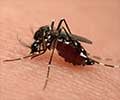List of 5 health risks one should be aware of when traveling to Brazil.

- Rio Olympic fears over Zika
- Zika virus is proving concerns for many travellers and athletes alike
- Yellow fever, malaria, rabies, dengue fever and altitude sickness are other health risks //present in Brazil
However, even though this infection is receiving the most press coverage due to its recent increase, there are other risks present in Brazil which the would-be traveler should be mindful of, and make preparations to prevent prior to departure.
Yellow Fever
Spread by mosquitoes, yellow fever patients will develop the usual fever symptoms such as a high temperature, sickness and headache, which may clear after a few days. But roughly one in seven will go on to develop more severe effects.The condition isn’t usually present in urban areas but is known to have a presence in rural Brazilian regions. If traveling to these areas, immunization is recommended, and should be administered at least 10 days prior to travel.
Malaria
This mosquito-transmitted infection can be life-threatening. In Brazil, there were 143,000 cases in 2014. Risk of infection is categorized as ‘low’ by the Center for Disease Control and Prevention. However malaria should always be taken seriously due to the potentially life-threatening nature of infection.Rabies
Transmitted via physical contact (bites, scratches and licking) with infected animals, (usually dogs) rabies is a deadly virus, and there is no agreed method of treatment for someone who is infected once symptoms have begun to develop. In such cases, the patient will very likely not make a recovery.Dengue Fever
This illness is a mosquito-borne virus, and although it is often not serious, causing the usual symptoms of fever (such as raised temperature, headache and muscle and joint pain) before dissipating, it can on occasion turn severe.There is no vaccination for dengue fever, so bite prevention measures are key. These include wearing long sleeves and covering exposed areas of skin wherever possible, and using repellent products such as DEET spray.
Altitude Sickness
Many parts of Brazil (Rio included) are significantly above sea level, and caution is advised when ascending and descending at high altitudes. This means giving your body time to acclimatize to the difference in oxygen consistency, by pacing your travel between altitudinous destinations.It’s recommended that travelers who aren’t used to lower oxygen levels allow their bodies 2-3 days to get used to the environment. One whole day’s rest is also important, ideally every three days.
In cases where a gradual, measured ascent or descent is not feasible, the medication Diamox can ease symptoms and make the transition easier. However, it should not be considered a substitute for gradual travel.
Reference:
- Our Malaria World Map of Estimated - (https://www.treated.com/dr-wayne-osborne/our-malaria-world-map-of-estimated-risk)










